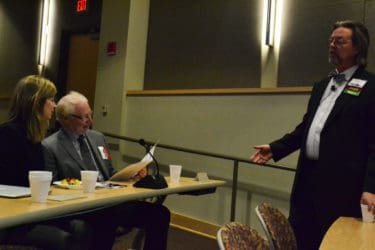Dementia Update Helps Educate Caregivers, Health Care Professionals
| People with dementia too often are seen as problems to be managed and medicated instead of individuals who clinicians and caregivers should listen to and work with, G. Allen Power, M.D., said.
He was a guest speaker Dec. 1 at the third annual Dementia Update at UAMS. Power is a clinical associate professor of medicine at the University of Rochester, New York and the author of the books Dementia Beyond Disease and Dementia Beyond Drugs.
“Why do I challenge this idea of symptoms of dementia being those behavioral expressions?” Power said. “Once you get that label the stigmas take over.”
Once the stigma of dementia is attached to an individual, too many of their behaviors are misinterpreted as stemming from that state of mind. If someone without a diagnosis of dementia goes to a Costco or a Sam’s Club to buy in bulk, they are more typically seen as saving money, but if someone with dementia does it, then they are “hoarding,” Power said.
Most people don’t like being touched by someone they hardly know, but if someone with dementia bristles at the experience, they are “agitated, aggressive and resistant,” he said.
When those behaviors present a problem to caregivers and health care professionals, too often they resort to medicating the patient with dementia rather than talking to them and finding a solution with them that might make being dressed or helped with a bath more comfortable.
“The experiences of people with dementia need to be brought into the center of how we treat dementia,” Power said.
A new approach is needed, one that focuses on well-being and on transforming the living and care environment around people with dementia.
“This person is experiencing the world differently than they used to and the best thing we can do is try to understand what that shifting experience is and find what we can do to try to help that person continue to succeed,” Power said. “We’ve been doing it for years for people with other disabilities, but we’re not building similar ramps for people with dementia. People with dementia need a kind of ramp the same way people in wheelchairs need real ones.”
Improving their well-being chiefly should concentrate in seven personal areas: identity, connectedness, security, autonomy, meaning, growth and joy.
Too often in care facilities where people with dementia reside, the staff regularly is rotated into different shifts, making it difficult for patients to build relationships with them, Power said.
One residential facility that stopped rotating staff saw respiratory infections fall by 70 percent, skin tears fall by 25 percent, fall accidents by 13 percent and formal family complaints about care drop, too, Power said.
Mark Pippenger, M.D., associate clinical professor in the UAMS College of Medicine Donald W. Reynolds Department of Geriatrics, introduced Power, then gave the audience of about 150 an overview of what dementia is and the most common causes of it. He is a behavioral neurologist and sees patients at the UAMS Walker Memory Center.
Pippenger said Alzheimer disease usually happens in older people, and memory loss is usually the predominant symptom. Lewy body patients also are older, but they often have a loss of motor control like that found in Parkinson disease. Vascular dementia often results from a known stroke, and frontal temporal disorder comes with behavioral changes and odd affect as the frontal and temporal lobes degenerate.
“For all these people, provide the most detailed, best diagnosis you can and stop the drugs that can make them worse,” Pippenger said. “Address the safety and legal issues early on, and get them support services.”
The conference was the third annual Dementia Update to be presented by the Walker Memory Center at the UAMS Donald W. Reynolds Institute on Aging. Avenir Memory Care, Senior Placement Services of Arkansas and Woodland Heights supported the conference.
Following the presentations from Pippenger and Power, speakers in other sessions covered topics including person-centered management of care; music and memory; managing difficult behaviors; and medication de-prescribing.



